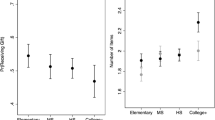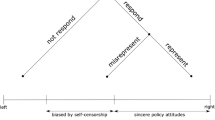Abstract
The problem of false negatives, people who really have attitudes but refrain from expressing them, could seriously bias the analysis, but has largely been neglected. Using a survey data including a number of “Don’t know” responses, this paper examined whether “Don’t know” respondents had underlying attitudes. We treated these nonresponses as nonignorably missing, in the sense that “Don’t know” responses are related to the answer of the question in some partially unknown way. We proposed a method to estimate parameters in a logit model when the covariates are nonignorably missing. The method simultaneously employed two generalized linear models: the proportional odds model for the response variable “Party-Support”, and the multinomial logit model for the nonresponse. We found that “Don’t know” responses to the Cabinet support question depended on whether the respondents supported the Cabinet, indicating the existence of false negatives. We also found that determining which party to support was based on voters’ ideology, city size and stance toward the Cabinet, even with the false negatives.
Similar content being viewed by others
References
Abe, Y., Kanazawa, Y., & Kabashima, I. (1998), Modeling party support of Japanese voters in the early 1996. Behaviormetrika, 25, 25–44.
Agresti, A. (1990). Categorical data analysis. New York: John Wiley & Sons.
Baker, S. G. & Laird, N. M. (1988). Regression analysis for categorical variables with outcome subject to nonignorable nonresponse. Journal of the American Statistical Association, 83, 62–69.
Dempster, A. P., Laird, N. M., & Rubin, D. B. (1977). Maximum likelihood from incomplete data via the EM algorithm (with discussion). Journal of the Royal Statistical Society B, 39, 1–38.
Fitzrnaurice, G. M., Laird, N. M., & Zahner, G. E. P. (1996). Multivariate logistic models for incomplete binary responses. Journal of the American Statistical Association, 91, 99–108.
Forster, J. J. & Smith, P. W. (1998). Model-based inference for categorical survey data subject to non-ignorable non-response. Journal of the Royal Statistical Society B, 60, 57–70.
Gilljam, M. & Granberg, D. (1993). Should we take don’t know for an answer? Public Opinion Quarterly, 57, 348–357.
Ibrahim, J. G. (1990). Incomplete data in generalized linear models. Journal of the American Statistical Association, 85, 765–769.
Ibrahim, J. G., Lipsitz, S. R., & Chen, M. -H. (1999). Missing covariates in generalized linear models when the missing data mechanism is non-ignorable. Journal of the Royal Statistical Society B, 61, 173–190.
Inoguchi, T. (1983). Gendai nihon seiji keizai no kouzu: Seifu to shijo (Contemporary Japanese political economy: government and market). Tokyo: Toyo Keizai Shinposha (in Japanese).
Kabashima, I. (1998). Seiken koutai to yukensha no taido henyo (Power changes and attitude changes of eligible voters). Tokyo: Bokutakusha (in Japanese).
Kabashima, I. & Ishio, Y. (1998). The instability of party identification among eligible Japanese voters. Party Politics, 4, 151–176.
Kabashima, I. & Yamada, M. (1995). Seito shiji no henndou to mutouhasou no keisei (The change in party support and the formation of non-partisan voters). Senkyo, 48, 1–17 (in Japanese).
Little, R. J. A. & Rubin, D. B. (1987). Statistical analysis with missing data. New York: John Wiley & Sons.
Louis, T. A. (1982). Finding the observed information when using the EM algorithm. Journal of the Royal Statistical Society B, 44, 226–233.
Manski, C. F. & McFadden, D. (1983). Structural analysis of discrete data with econometric applications. London: The MIT Press.
McCullagh, P. & Neider, J. A. (1989). Generalized linear models (2nd ed). London: Chapman & Hall.
Miyake, I. (1989). Tohyo kodo (Electoral behavior). Tokyo: University of Tokyo Press (in Japanese).
Miyake, I. (1995). Nihon no seiji to senkyo (Japanese electoral politics in disarray). Tokyo: University of Tokyo Press (in Japanese).
Miyake, I. (1998). Seitou shiji no kouzou (Structure in political party support). Tokyo: Bokutakusha (in Japanese).
Richardson, B. M. (1988). Constituency candidates versus parties in Japanese voting behavior. American Political Science Review, 82, 695–718.
Rubin, D. B. (1976). Inference and missing data. Biometrika, 63, 581–592.
Watanuki, J., Miyake, T., Tnoguchi, T., & Kabashima, I. (1986). Nihonjin no senkyo kodo (Japanese electoral behavior). Tokyo: University of Tokyo Press (in Japanese).
Author information
Authors and Affiliations
Additional information
An earlier version of this paper was presented at the annual conference of Japanese Statistical Society in Tokyo, Japan, July 1998. We wish to thank Ikuo Kabashima and Yoshito Ishio for permission to use the data set.
About this article
Cite this article
Lee, SG., Kanazawa, Y. Handling “Dont Know” Survey Responses: The Case of Japanese Voters on Party Support. Behaviormetrika 27, 181–200 (2000). https://doi.org/10.2333/bhmk.27.181
Received:
Revised:
Published:
Issue Date:
DOI: https://doi.org/10.2333/bhmk.27.181




